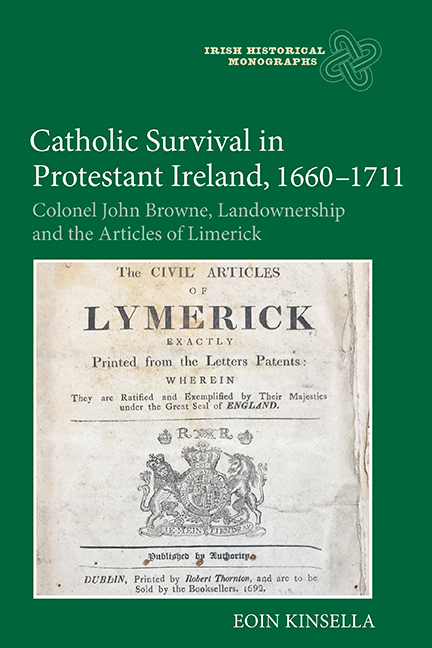 Catholic Survival in Protestant Ireland, 1660–1711
Catholic Survival in Protestant Ireland, 1660–1711 from Part II - The Articles of Surrender
Published online by Cambridge University Press: 28 June 2018
Following the surrender of Limerick, for many Catholics the choice was stark: to endure exile on the continent, or to remain in Ireland under the government of a victorious yet resentful Protestant minority. Perhaps 12,000 members of the Jacobite army left for France, determined to return and restore their king to the throne. Thousands more snubbed the Jacobite cause and sought to enlist with William's allies in Europe. Some were simply unable to leave, hampered by familial ties or a lack of money. Others firmly resisted the temptation to flee, preferring to retain possession of their land and to enjoy the rights promised to them by the articles of surrender. These were the articlemen, the ‘dastard gentry’ of Catholic Ireland.
The historiography of Catholic Ireland in the 1690s has been dominated by the articles of Limerick; understandably so given their status as the end point of the Williamite war, and the various controversies surrounding their confirmation by the Irish parliament. One of the results of this focus has been to overshadow the importance of the other articles of surrender to the Williamite settlement in Ireland. Articles of surrender were also signed at Drogheda, Waterford, Galway, Inis Boffin and Sligo. The principal advantage of the articles was protection from forfeiture of the estates of those who claimed under them. Claimants to the articles of Galway and Limerick were required to prove their eligibility in specially established courts of claims, which sat in 1692, 1694 and from 1697 to 1699.
The articles of Drogheda, Waterford, Inis Boffin and Sligo are referred to here as minor articles, due to the low numbers known to have received their benefit, relative to Galway and Limerick. The Irish and English governments also devoted a much smaller degree of attention to their interpretation and implementation. These articles were, however, of great importance to the men who claimed their benefit, as each surrender was adjudged to protect the real estates of its claimants. Yet proving eligibility to the articles was merely the first step for the articlemen in ensuring that they received their benefit. Acts of the Irish and English parliaments were required to enshrine the articles in legislation. With three exceptions, these acts were not passed with the intention of confirming the articles.
To save this book to your Kindle, first ensure [email protected] is added to your Approved Personal Document E-mail List under your Personal Document Settings on the Manage Your Content and Devices page of your Amazon account. Then enter the ‘name’ part of your Kindle email address below. Find out more about saving to your Kindle.
Note you can select to save to either the @free.kindle.com or @kindle.com variations. ‘@free.kindle.com’ emails are free but can only be saved to your device when it is connected to wi-fi. ‘@kindle.com’ emails can be delivered even when you are not connected to wi-fi, but note that service fees apply.
Find out more about the Kindle Personal Document Service.
To save content items to your account, please confirm that you agree to abide by our usage policies. If this is the first time you use this feature, you will be asked to authorise Cambridge Core to connect with your account. Find out more about saving content to Dropbox.
To save content items to your account, please confirm that you agree to abide by our usage policies. If this is the first time you use this feature, you will be asked to authorise Cambridge Core to connect with your account. Find out more about saving content to Google Drive.